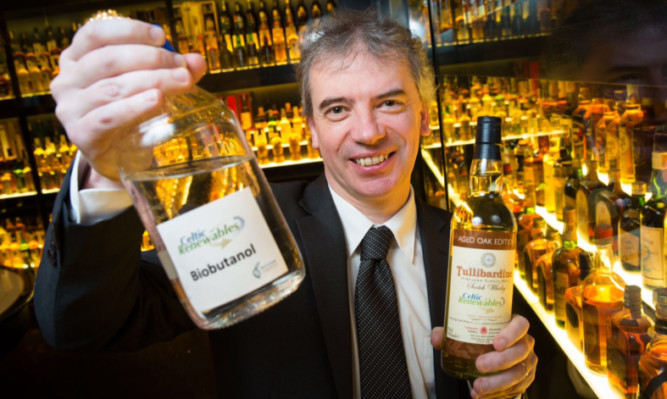A Scottish company has become the first in the world to produce biofuel capable of powering cars from whisky production leftovers.
The breakthrough was born in Perthshire as the residues came from the Tullibardine Distillery in Blackford.
Celtic Renewables is now seeking funding from the Department for Transport to build its first demonstration facility at the Grangemouth petrochemical plant by 2018.
Company owners estimate it could be the market leader in an industry worth more than £100 million to the UK economy.
The Edinburgh company, a spin-out from the Biofuel Research Centre at Edinburgh Napier University, has manufactured the first samples of bio-butanol from the by-products of whisky fermentation.
It has spent the last year developing its process as part of a £1m programme funded by the Department for Energy and Climate Change under its Energy Entrepreneurs Fund.
Celtic Renewables, in partnership with the BioBase Europe Pilot Plant in Belgium, produced the first samples of bio-butanol from waste, using a process called Acetone-Butanol-Ethanol fermentation.
ABE fermentation was developed in the UK a century ago but died out in competition with the petrochemical industry.
Bio-butanol is now recognised as an advanced biofuel a direct replacement for petrol and Celtic is seeking to reintroduce the process to Europe for the first time since the 1960s, using the millions of tonnes of annual whisky production residues as its raw material.
The biofuel is produced from draff the sugar-rich kernels of barley which are soaked in water for whisky fermentation and pot ale, the copper-containing yeasty liquid left over from distillation.
Professor Martin Tangney, Celtic’s president, said: “Showing the world our first sample of biofuel produced from whisky by-products is a proud moment.
“We have successfully taken a defunct technology and adapted it to current market conditions, attracting the investment and partners required to scale up to industrial production and prove this works at scale.”
Winners of the DfT’s £25m advanced biofuel demonstration competition will receive funding of up to £12m over three years to build an operational biofuel facility that can produce at least one million litres of biofuel a year.
Chief executive Mark Simmers said “This historic sample could herald a new era in sustainable biofuel and the birth of a UK industry worth £100 million a year.”
Professor Wim Soetaert, chief executive of BioBase Europe, said: “We are excited about the future with Celtic Renewables and we are committed to turn our collaboration into a major success.”
Energy Secretary Ed Davey hailed the breakthrough.
